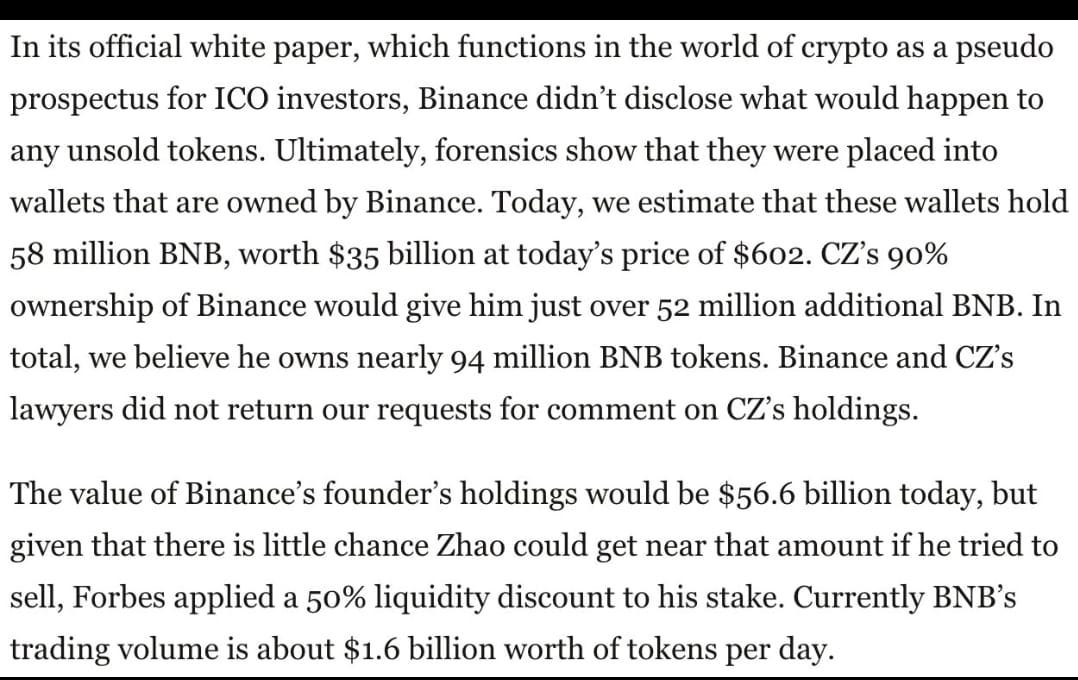
Recent reports have highlighted a significant concentration of Binance Coin (BNB) ownership. A forensic analysis by Gray Wolf Analytics, as reported by Forbes, indicates that Changpeng Zhao, the former CEO of Binance, holds approximately 64% of the circulating supply of BNB, equating to around 94 million tokens. This revelation places Zhao’s net worth at an estimated $61 billion, ranking him as the 24th richest person globally. The BNB token, used within the Binance platform for fees and rewards, has a maximum supply of 200 million, with over 153 million tokens currently in circulation.
Despite legal challenges, including a guilty plea by Zhao to charges related to violating the Bank Secrecy Act and a substantial fine for Binance, the value of BNB has experienced significant growth, with its price more than doubling from early 2024 to a peak in June.
This growth has occurred even as Zhao began serving a prison sentence, showcasing the resilience and continued investor confidence in BNB amidst turbulence. The situation underscores the complexities of cryptocurrency ownership and market dynamics, where tokenomics can significantly impact both the valuation of digital assets and the wealth of individuals involved in the crypto industry.
Register for Tekedia Mini-MBA edition 19 (Feb 9 – May 2, 2026): big discounts for early bird.
Tekedia AI in Business Masterclass opens registrations.
Join Tekedia Capital Syndicate and co-invest in great global startups.
Register for Tekedia AI Lab: From Technical Design to Deployment (next edition begins Jan 24 2026).
Is BNB Token Really Decentralized?
The BNB Token, which is the native coin of the BNB Chain, has been a subject of discussion regarding its decentralized nature. Initially founded by the cryptocurrency exchange Binance, the BNB Chain has evolved to become community-driven, with Binance being one of many contributors within the ecosystem. The BNB Chain consists of several blockchain networks, each serving different purposes, and the BNB Token plays a dual role within this ecosystem.
It functions both as the fuel for transactions on the chain and as a governance token, allowing token holders to participate in decentralized on-chain governance. The BNB Chain’s compatibility with the Ethereum Virtual Machine (EVM) also means it can run Ethereum-based decentralized applications (dapps), further extending its utility and reach within the blockchain community.
The decentralization of the BNB Token is further evidenced by the structure of the BNB Chain, which includes the BNB Beacon Chain for governance and staking, and the BNB Smart Chain for smart contract capabilities. Additionally, specialized networks like zkBNB and opBNB are under development to enhance scalability and reduce transaction costs, using optimistic and zero-knowledge rollups as scaling technologies. BNB Greenfield, another network within the ecosystem, is a decentralized storage network designed to support data-intensive dapps in gaming and social media.
High ownership concentration in cryptocurrency, such as the reported 64% ownership of BNB by Changpeng Zhao, can have several implications. It may lead to increased market power for the majority holder, potentially influencing token pricing and market liquidity. Additionally, it could raise concerns about decentralization, one of the foundational principles of blockchain technology.
Such concentration might also heighten regulatory scrutiny, as authorities may view it as a risk to financial stability or consumer protection. Lastly, it could affect investor confidence if market participants perceive that the majority holder has too much control over the asset’s future.

Despite its origins and close association with Binance, the BNB Chain operates independently of the exchange. Binance CEO Changpeng Zhao has addressed misconceptions about Binance’s ownership or control over the BNB Chain, emphasizing its independent operation. The BNB Chain’s governance model, which includes decentralized on-chain governance, is a testament to its decentralized nature, allowing BNB Token holders to have a say in the network’s future direction.
While the BNB Token originated from a centralized entity, its current operation and governance structure align with the principles of decentralization. The BNB Chain’s multiple networks and the role of the BNB Token within this ecosystem demonstrate a commitment to decentralization, with community-driven development and governance at its core.



